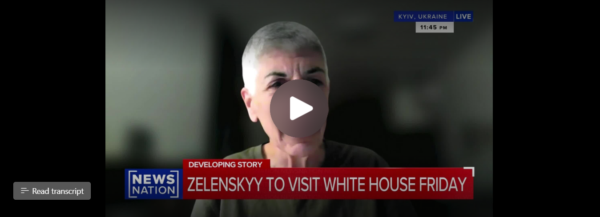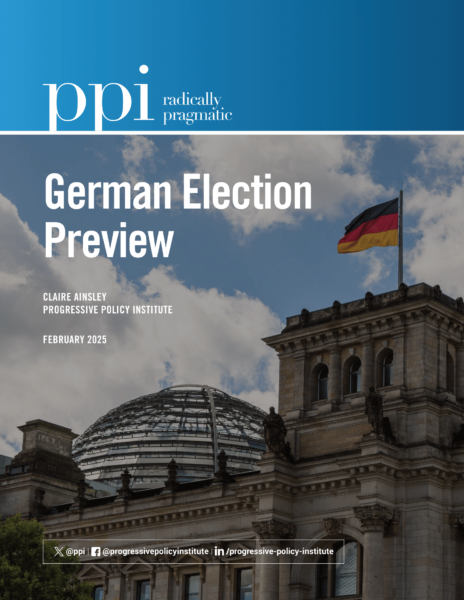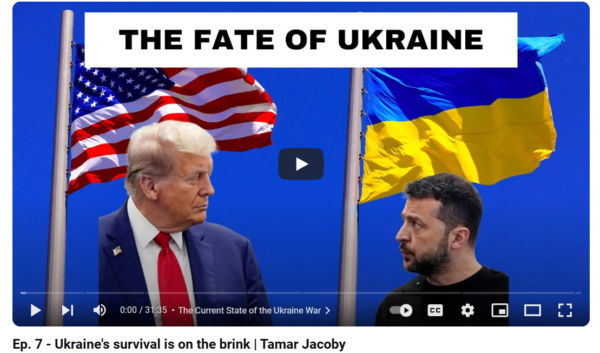issue: Foreign Policy & Defense
Jacoby for Washington Monthly: Donald Trump and the End of American Global Leadership
The United States strove for more than 100 years—since we entered World War I in April 1917—to hold its own as leader of the free world. It took Donald Trump precisely one month to abdicate that leadership, destroying everything his predecessors—from Woodrow Wilson to Franklin D. Roosevelt and Ronald Reagan—had built through two global conflicts, the Cold War and the creation of the post-World War II Western alliance. Trump thinks he is strong and making America stronger. But his bullying of Ukraine and capitulation to Vladimir Putin make us immeasurably weaker—a loss of reputation and power never likely to be regained.
Americans sympathetic to Ukraine have long worried that Trump would turn against the country on the receiving end of Russia’s brutal aggression. But the president’s behavior in the last week stunned even the Trump worriers. His ingratiating overture to the Kremlin, his preemptive giveaways—suggesting Ukraine should cede one-fifth of its territory and renounce joining NATO before Moscow even asked for those concessions—and his administration’s rush to meet a Russian delegation without Ukraine or our European allies, all of that was stunning enough.
But now the American president has sunk to baseless insults, calling Ukrainian President Volodymyr Zelensky a “modestly successful comedian,” a “dictator,” and a thief. Zelensky’s measured response, telling Ukrainians that he was counting on their unity and courage and “the pragmatism of America,” showed up the president’s barbs for the schoolyard taunts they were.
Read more in Washington Monthly.
German Election Preview: Implications for the Global Center-Left
WASHINGTON – As Germany prepares for its snap federal election on February 23, the Progressive Policy Institute (PPI) has released a “German Election Preview,” authored by Claire Ainsley. The report provides a deep dive into the electoral landscape, key policy debates, and the broader lessons for center-left parties globally.
The election marks the first since Olaf Scholz’s Social Democrats (SPD) won the Chancellery in 2021, ending years of Christian Democrat Union (CDU) dominance. However, as Germans return to the polls, the CDU is poised to reclaim power, while the SPD struggles in third place behind the far-right Alternative for Germany (AfD), which has doubled its support since 2021.
“The German election is not just a national event — it has global significance,” said Claire Ainsley, Director of PPI’s Center-Left Renewal Project. “The SPD’s difficulties mirror the broader challenges for center-left parties in balancing economic credibility, climate ambition, and voter concerns over immigration. Their experience provides crucial lessons for Democrats in the U.S. and Labour in the U.K. as they navigate similar political headwinds.”
Key findings from the report include:
- A Weakened SPD and a Surging Right: The SPD’s coalition with the Greens and Free Democratic Party (FDP) has fractured, following economic stagnation, unpopular climate policies, and a contentious debate over immigration.
- CDU’s Dilemma: If the CDU wins, it must decide whether to maintain Germany’s long-standing firewall against cooperating with the far-right AfD, and balance political risk by forming another three-party coalition.
- Economic and Climate Challenges: Germany’s strict “debt brake” has constrained public investment, while the handling of climate policies has fueled voter backlash and who pays for climate ambitions.
- Immigration as a Defining Issue: Immigration has overtaken the economy as voters’ top concern, with a YouGov poll showing 80% of Germans believing migration levels have been too high in the past decade.
The report argues that the SPD’s struggles highlight a larger challenge for center-left parties worldwide: the need to deliver tangible economic benefits to working people while avoiding policies that deepen voter alienation.
“With working-class voters moving away from the center-left in multiple democracies, leaders must focus on delivering real results — whether on economic security, immigration, or energy affordability,” said Ainsley. “Otherwise, these voters will continue to look elsewhere, as we’ve seen in the U.S. and across Europe.”
After the U.S. navigated its own electoral challenges in 2024 and focuses on the future, PPI’s report offers critical insights into how progressive parties can adapt and rebuild durable political majorities.
Read and download the report here.
PPI’s project on Center-Left Renewal was launched in January 2023 to catalyze and create a renewal of the center-left, sharing ideas, strategies, and research around the world. Since its inception, the project has facilitated a shared exchange between center-left parties, contributing new ideas and analysis designed to further the prospects of the center-left. The project’s outputs are shared by PPI here: www.progressivepolicy.org/project/project-on-center-left-renewal/. Sign up to our project mailing list at info@ppionline.org.
Founded in 1989, PPI is a catalyst for policy innovation and political reform based in Washington, D.C. Its mission is to create radically pragmatic ideas for moving America beyond ideological and partisan deadlock. Learn more about PPI by visiting progressivepolicy.org. Find an expert at PPI and follow us on X.
###
Media Contact: Ian O’Keefe – iokeefe@ppionline.org
German Election Preview
INTRODUCTION
On 23 February 2025, Germans will head to the polls in the first federal election since Olaf Scholz’s Social Democrats (SPD) came from third to first to win the Chancellery in October 2021, following the departure of Chancellor Angela Merkel and a long period of Christian Democrat Union (CDU) dominance.
In 2021, the SPD became the lead party in a coalition government with the Green Party and Free Democratic Party (FDP), agreeing on an ambitious government programme based on their ‘four missions for the future’ outlined in the SPD’s winning manifesto.
Yet Sunday’s election looks set to provide a very different outcome, with the CDU back in pole position, and the ruling SPD trailing in a low third with the Greens just behind them in fourth. Second place in the polls is the Alternative for Germany (AfD), a far-right challenger party that has doubled its support since the 2021 federal election, when it came fifth with 10% of the vote.
As attention turns to this historic election, what might we expect from the results? And what lessons can center-left parties elsewhere draw from the German experience?
Read the full report.
Jacoby in The Washington Monthly: Trump Provokes Fear in the Western Alliance
Donald Trump’s push for peace in Ukraine has left the West aghast and with good reason. The man expected to pull America off the world stage seems determined to have a hand in every conflict. The candidate who campaigned on fear of World War III is set on upending the rules that prevented it for 80 years. The self-styled master negotiator is giving away the game before it begins, ceding Moscow’s main demands before Vladimir Putin even agrees to come to the table. Long-time American allies—including in all the capitals of Europe—have been left out of talks about Ukraine.
The outcome in Ukraine is to be determined, but what is certain is the damage to the international order—perhaps permanent damage. Tensions between Washington and Europe dominated this weekend’s Munich Security Conference, and on Monday anxious European leaders will gather in Paris to plan a collective response.
The administration’s diplomacy is inscrutable. First, Secretary of Defense Pete Hegseth said one thing—that there could be no return to Ukraine’s prewar 2014 borders, no Ukrainian membership in NATO, and no American peacekeeping troops in Ukraine. John Coale, America’s deputy envoy to Ukraine, said the opposite: the U.S. had not ruled out NATO membership or restoring Ukrainian territory. Then, Vice President J.D. Vance dramatically shifted the tone, threatening increased sanctions on Russia and sending U.S. troops to Ukraine, as Secretary of State Marco Rubio tried to reassure Kyiv, declaring that the U.S. has “a stake in Ukraine’s long-term independence.”
Read more in The Washington Monthly.
Jacoby for The Bulwark: What USAID Really Did in Ukraine
Amid the tide of bilge—lies, personal smears, conspiracy theories, and other drivel—offered by the Trump administration in the last two weeks as an alleged rationale for shutting down USAID and ending America’s decades-long tradition of foreign aid, one legitimate question stands out: How exactly is foreign aid in America’s interest? Or, to put it another way: How and to what extent do we benefit from spending money to improve conditions and better lives in other countries?
Consider USAID’s portfolio in Ukraine, which expanded sharply after Russia’s invasion in 2022—from $200 million in 2021 to $16 billion in 2023, adding up to some $35 billion in the past three years. USAID has served as the primary funnel for America’s nonlethal support for Ukraine, now the agency’s largest recipient worldwide.
The expansion of assistance to Ukraine originally enjoyed strong bipartisan support. According to a public “exit memo” by Biden administration USAID Administrator Samantha Power, the agency leveraged a three-to-one match by other donors, including the private sector and allied countries. Funding was spread across an array of projects, from humanitarian aid for elderly residents holding out in the rubble of ruined frontline cities to digital innovation designed to reduce corruption and keep government services running.
Keep reading in The Bulwark.
Jacoby for Washington Monthly: As Ukraine Fights, Echoes of Historic Meetings in Yalta and Helsinki Abound
The anniversary of the Yalta Conference, which ended 80 years ago this week in a Soviet-occupied Crimean resort on the Black Sea, has a special significance in central and eastern Europe—and not just because it took place in a Ukrainian city that Russian soldiers once again occupy.
At the time, in the U.S and allied countries, the agreement between Franklin D. Roosevelt, Winston Churchill, and Josef Stalin was hailed as a historic breakthrough, one step away from the end of World War II and proof positive that the U.S. and the Soviet Union would continue to cooperate in the postwar era. The countries in what would soon be known as the Soviet sphere of influence felt no such euphoria. They understood right away, as Americans would learn in coming months, that the upshot of the conference was to cement Soviet control over a broad swath of eastern Europe—countries from Ukraine to Estonia, more than a thousand miles north.
It’s an anniversary that holds important lessons for Donald Trump, unlikely as it is that he is reading history as he prepares to sit down with Vladimir Putin and perhaps once again carve up the territory in this much-contested corner of Europe.
Read more in the Washington Monthly.
Jacoby for Washington Monthly Podcast: Ukraine’s Survival on the Brink
Co-hosts Anne Kim and Garrett Epps speak with Tamar Jacoby, who is living and working in Kyiv as Director of the Progressive Policy Institute’s New Ukraine Project. She speaks about the future of Ukraine, the changing face of warfare, and Vladimir Putin’s potential ambitions in Europe.
Jacoby for Forbes: European Investment In The Ukrainian Defense Industry Threatened By Personnel Shuffle
In mid-2024, as the war in Ukraine ground into a third year and Western military aid showed ominous signs of flagging, Kyiv and its friends in Europe began moving toward a different approach: producing weapons closer to the fighting, on Ukrainian soil. This would require help from Europe and the U.S.—significant funding and oversight. But it promised in the long haul to reduce Ukrainian dependence on the West and, after the war, to provide a powerful new arsenal for Europe.
Denmark was the first country to participate, followed by other northern European nations, and early efforts were promising. Altogether in 2024, what became known as the “Danish model” provided more than a half billion dollars for Ukrainian weapons production, and the approach was warmly welcomed in Kyiv, with President Volodymyr Zelensky and others calling for its expansion in 2025.
Then, astonishingly, in late January, Ukrainian Defense Minister Rustem Umerov suspended the well-regarded director of the agency that had made the new approach possible by bringing transparency and accountability to the agency that purchases weapons and ammunition for the Ukrainian army.
Read more in Forbes.
Jacoby for Forbes: Amid A National Conscription Crisis, One Ukrainian Unit Takes A Different Approach
Denys Rizhov, 21, stumbled on the Third Assault Brigade’s drone school, Kill House, by accident—a random link to a YouTube video. A soft-spoken, reserved young man with a ponytail, bored by college, working odd jobs and uncertain what his future would bring, Rizhov was intrigued enough to follow up on the web. The more he learned, the more he liked, and he decided to start saving the $190 it would cost for a week of classes in the technology and tactical use of unmanned aerial vehicles.
He scrimped and saved for months, and when he finally took the course, he couldn’t have enjoyed it more. Now he’s planning to go back for further training—a second week of drone school and then the Third Assault Brigade’s intensive seven-day course that tests volunteers interested in joining the unit.
At a time when the lion’s share of Ukrainians is frightened of joining the armed forces or actively resisting it—hiding from recruiters and scheming to flee the country illegally—Rizhov is increasingly drawn to enlisting in an elite combat unit, attracted by evolving drone technology and what he’s seen of the Third Brigade’s bracing ethos.
Continue reading in Forbes.
Jacoby for Washington Monthly: In Ukraine’s Army, the “Heavenly Punishment” Battalion’s Morale is Unwavering, Its Blows Punishing
A half dozen officers from Ukraine’s 54th Mechanized Brigade hover around the table in what was once a modest civilian home on the outskirts of Sloviansk, a small, war-torn city just behind the front line. The table is heaped with a holiday feast—meat, rice pilaf, salads, and even smoked salmon canapés. We’re waiting for the colonel, code-named Khors, a career officer in his early 50s with a Cossack haircut—shaved on the sides to show off a long, flaxen topknot. When he arrives, we sit down to eat.
No one speaks of the battle a few days before—a close encounter with more numerous and better armed Russian forces. The Ukrainians mounted a robust defense, and the men now seem eager to put it behind them. But when I ask about morale, their faces grow longer. “People are tired,” Khors says, staring into the middle distance. “Especially the commanders. And the winter doesn’t help.”
After nearly three years of all-out combat, the war in Ukraine is heading into what could be a pivotal few months. The Russians have been moving forward on the eastern front, throwing troops at the fight and losing as many as 2,000 a day, but still advancing yard by yard into Ukrainian territory. Intensifying bombardments terrorize cities far from the battlefield. Over half the country’s electricity-generating capacity has been destroyed; some households experience daily outages. Ammunition is somewhat more plentiful than when U.S. aid stalled a year ago, but many units complain they are short of manpower.
Perhaps most uncertain is what a Trump presidency will bring. Will the new American leader try to make good on his promise to end the war in one day? Will Vladimir Putin heed his call to come to the negotiating table? And what kind of peace deal might they strike, with or without Ukrainian approval?
Continue reading in Washington Monthly.
Jacoby for Forbes: Bound By The Rule Of Law, Europe Wrestles With Escalating Hybrid Warfare
Looking back, Estonian officials are confident that they handled the May 2024 buoy incident about as well as it could be handled. Estonian border guards caught the Russian theft on video: a handful of uniformed men in patrol boats moving slowly up the river between the two countries, systematically removing 25 of the 50 buoys laid down by Estonia to mark the frontier. “Moscow is testing our reaction,” director general of the Estonian police and border guard Egert Belitšev tells me as we watch the tape. “When we don’t react, they go further.”
A tiny country of 1.4 million, formerly occupied by the Soviet Union, Estonia has long seen itself as the front line between Russia and the West, and Estonians are used to the so-called “hybrid” aggression that has been escalating elsewhere in Europe in recent months. The day after the buoy incident, the foreign minister summoned Moscow’s top diplomat in Tallinn and told him in no uncertain terms that the theft was unacceptable. Will that be enough to deter similar sabotage this year? Belitšev shrugs off the question. “We couldn’t follow the provocation,” he explains. “We do not enter Russian territory. Our job is to keep Estonians safe, not provoke World War III.”
It has taken the rest of Europe several years to recognize the growing challenge posed by Moscow’s shadow warfare. But with the provocations increasingly frequent and increasingly menacing—not just cyberattacks and disinformation but bomb threats, arson, and a foiled assassination attempt last year—officials across the continent are wrestling with how to react.
Western countries’ commitment to the rule of law generally prohibits responding in kind—what separates us from the Russians, after all, if not our commitment to a rules-based international order? But it’s not clear that the tools we have at hand are enough to deter Moscow from further aggression. In Western Europe, as in Ukraine, Vladimir Putin believes might makes right, and the civilized world has been largely unable to come up with a counterargument.
Read more in Forbes.
PPI Statement on Biden’s Decision to Block Nippon Steel Purchase of U.S. Steel
Today, PPI issued the following statement in response to President Biden’s decision on Nippon Steel’s purchase of U.S. Steel:
“President Biden’s decision this morning to block Nippon Steel’s purchase of U.S. Steel is a bad mistake on the merits, and the White House’s explanation of the reasons is so opaque and so lacking in substance as to suggest that it knows this. Here is the core of the release (with ellipses stripping out some legal language):
‘(a) There is credible evidence that leads me to believe that … Nippon Steel Corporation … through the proposed acquisition of United States Steel Corporation … might take action that threatens to impair the national security of the United States; and
‘(b) Provisions of law, other than section 721 and the International Emergency Economic Powers Act … do not, in my judgment, provide adequate and appropriate authority for me to protect the national security in this matter.’
“Nothing in the release hints in any way as to what ‘action’ Nippon Steel might take and how it might differ from the actions of the company’s steelmaking facilities in Alabama for over a decade. Neither does it suggest what the ‘credible evidence’ the statement mentions might involve. Still, less does the release offer any way to resolve the questions raised if this mutually agreed-upon transaction doesn’t go ahead:
- Will U.S. Steel now follow through on its statement earlier this year that blocking the transaction would lead to the closure of western Pennsylvania steel mills? If so, how would the administration explain its decision to the affected communities and workers?
- How does the administration view the possibility of a blast-furnace steel monopoly emerging as a result of an alternative purchase, and its impact on downstream industries such as auto production?
- Does the administration, in general, feel that foreign investors from allied countries such as Japan, Korea, the European Union, Canada, and the U.K., who employ a quarter of all U.S. manufacturing workers, are unreliable?
“Looking forward, it is very likely to have set a bad precedent for future CFIUS (Committee on Foreign Investment in the United States) decisions on sensitive transactions, which up to now have been civil-service driven and based on objective criteria. As such, it does a disservice to U.S. businesses, to foreign firms interested in manufacturing and employing skilled workers in the United States, and to consumers and unions sharing an interest in transparent decision-making with a clear statutory basis. It also creates deep uncertainty about the future of U.S. Steel, and in particular, its Pennsylvania operations.
“Little about the rationale for this very controversial decision, with its attendant damage to an important alliance and its potential harm to American heavy industry, is clear. The Biden administration owes the country a better explanation, and we hope it will provide one in its remaining days.”
The Progressive Policy Institute (PPI) is a catalyst for policy innovation and political reform based in Washington, D.C. Its mission is to create radically pragmatic ideas for moving America beyond ideological and partisan deadlock. Learn more about PPI by visiting progressivepolicy.org. Find an expert at PPI and follow us on Twitter.
Follow the Progressive Policy Institute.
###
Media Contact: Ian O’Keefe, iokeefe@ppionline.org
Jacoby Interview for The Big Picture With Edwin Eisendrath
Edwin talks to Tamar Jacoby, director of the New Ukraine Project at the Progressive Policy Institute.
Jacoby, who is based in Kyiv, talked about the mood there, after almost three years of war in the country. “People are tired,” she said, “and that word doesn’t quite even capture it. Kyiv is far from the front, and life goes on in Kyiv. People go to restaurants and bars, and do live their lives, but just about everybody knows or is related to somebody who’s fighting, and indeed, most have casualties in their circle of a family or acquaintances. And the war is coming increasingly to Kyiv and to the west of the country because of the intensified missile and drone strikes.”
Check out the full episode.
Juul in The Hill: Progressives align with DOGE on defense cuts: ‘Let’s play ball’
Peter Juul, director of national security at the Progressive Policy Institute, a center-left think tank, said the defense budget should increase given the dangerous state of the world, even though he agreed the Pentagon could be more efficient.
“It’s hard to see where you can do that right at this point, unless you’re [proposing] a massive personnel cuts,” he said. “You might be able to shave the top line a bit, but it’s not going to be this massive savings.”
On Capitol Hill, Juul said there is “more appetite” to “keep things where they are or to push them even further,” calling the hope for defense cuts “wishful thinking by progressives.”
Read more in The Hill.
Jacoby for Washington Monthly: The Least Terrible Way for Ukraine to Negotiate with Russia
Many Ukrainians, used to making the best of bad situations, reacted to Donald Trump’s reelection with caustic humor. Among the most heard jokes play off his promise to end the war with Russia in 24 hours. “Has everyone set their timers?” one man asked on Facebook. But underneath the repartee, Ukrainians are tired—ground down by a war, now all but stalemated, that will soon enter its fourth year. So they wait, half-frightened, half-hopeful, for what could be a disastrous defeat or a welcome reprieve.
Few here doubt that Trump’s team will push for negotiations, requiring compromises from both sides but sacrifices mostly from Ukrainians. Morally, this is monstrous. Ukrainians are guilty of nothing but building their country, growing its economy, and yearning for an independent, democratic future. The Kremlin’s crimes, in contrast, are unending. They include the unlawful annexation of Crimea in 2014, a ten-year proxy war in eastern Ukraine, the unprovoked 2022 invasion, the kidnapping of some 20,000 Ukrainian children, and nearly three years of deadly missile strikes on schools, hospitals, and civilian targets in cities across a country of 40 million, to name just a few.
The world’s leading champion of might-makes-right, Vladimir Putin, flouts international norms and sides unashamedly with America’s enemies, from Iran to North Korea. Yet, under Trump, Kyiv and Moscow will now be treated as moral equivalents, two equal parties across a negotiating table, each expected to give a little to get a deal.
But indignation and outrage will do little to help Ukraine in the months ahead as the two sides jockey and the Trump team fine-tunes its approach. Even as the grim game plays out, some outcomes would be better than others—a relatively good peace versus an unspeakable, debilitating deal.






